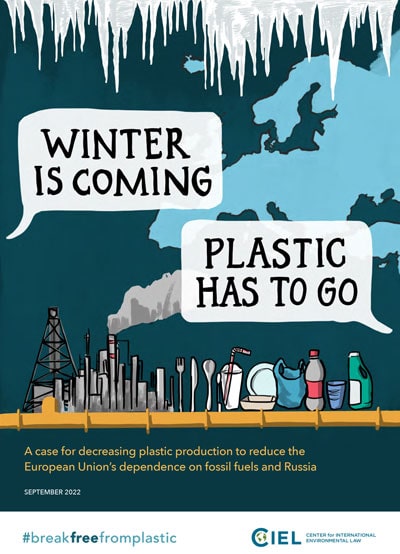Read updates on the fifth round of negotiations for Plastics Treaty ➝
Protect our planet! Last chance to join the call for a strong Plastics Treaty. SIGN THE PETITION NOW.


• Plastic production is by far the largest industrial oil, gas, and electricity user in the EU, overshadowing other energy-intensive industries. Yet, this extremely high fossil fuel-consuming industry remains a complete oversight in the EU public energy and climate debates. This is despite clear and feasible pathways to reduce consumption of one of its main products: plastic.
• In the EU in 2020, 38% of the gas and 22% of the oil came from Russia, making the energy-intensive petrochemical industry significantly reliant on Russian fossil fuels.
• To regain international leadership in fighting the climate and plastic pollution crises and to protect its citizens from escalating prices and resulting conflicts, the EU needs to confront and drastically reduce virgin plastic production.
• A business-as-usual scenario, where the plastic production industry plans on doubling its gas and oil-based production is incompatible with achieving the goals of the EU Green Deal, binding climate targets to keep global warming under 1.5°C, and addressing our urgent need to reduce our oil and gas consumption and dependency.
• The EU cannot buy its way out of the multiple current crises by simply replacing Russian fossil fuels with imports from other regions. EU and Member States’ attempts to secure oil and gas from Africa, the US, and elsewhere, offer only a short-term fix for a long-term problem while deepening the climate crisis and imposing significant environmental and health costs on the countries and communities where extraction occurs. Attempts to address the crisis must be rooted in justice, starting with phasing out all fossil fuels and laying the foundation for a just energy transformation.
• Together, Belgium, Germany, Spain, France, Italy, the Netherlands, and Poland are responsible for 77% of all plastic packaging waste in the EU. Achieving reductions of 50% in plastic packaging and 90% in recycling would lead to a reduction of 6.2 bcm of fossil gas and 8.7 million tonnes of oil at the EU level compared to 2020. These figures are the equivalent to the Czech Republic’s final oil and gas consumption in 2020.
The EU and its Member States must:
⚡️ First and foremost drastically reduce virgin plastic production. The fastest way to do so is by accelerating and expanding the implementation of the Waste Framework and Single-Use Plastics Directives, increasing the level of ambition and adopting prevention and reuse targets.
⚡️Adopt ambitious measures on packaging reduction in the context of the upcoming revision of the EU Packaging and Packaging Waste Directive (PPWD),
⚡️Ensure that measures taken to address the energy crisis restrict non-essential industry oil and gas use (e.i. the share that would typically go to producing unnecessary single-use plastics and packaging).
⚡️Push for high ambition on upstream measures within the negotiations of the plastics treaty.
⚡️Stop building new fossil fuel infrastructure – including petrochemical facilities, starting with a moratorium or freeze on permitting of new virgin plastic production facilities. At the same time, States must engage with the European petrochemical industry to set up decarbonization plans and a fossil-free future pathway and a needed just transition for this sector.

Learn more about the stories behind the Winter Is Coming Report: listen to our podcast
The petrochemical industry is the largest global driver of the increased demand for oil and gas, fueling the climate crisis and its disastrous impacts on the most vulnerable communities and ecosystems. Yet, this extremely high fossil fuel-consuming industry has remained a complete oversight in the EU public energy and climate debates. This is despite clear and feasible pathways to reduce consumption of one of its main products: plastic. Join us for #BreakFreeFromPlastic's new podcast series, Winter Will Come Again, hosted by Sarah Diedro Jordão and with special guests from the Break Free From Plastic movement and beyond.
For any questions relating to the report, please reach out to Delphine Lévi Alvarès at delphine@breakfreefromplastic.org